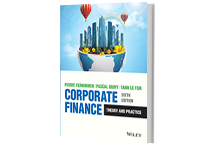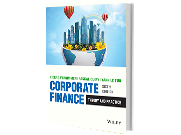Comment, question or quotation of the day
13-04-2024 : The strange accounting for capital gains on partial disposals of fully consolidated subsidiaries.
Last week, Wendel sold 9% of Bureau Veritas on the stock market for €1.1 billion, reducing its controlling stake from 51% to 42% of the voting rights. The capital gain was €800m, but did not appear in the profit and loss account, which goes against common sense.
In doing so, Wendel is simply following the IFRS accounting principles that apply to it, which stipulate that as long as the controlling shareholder remains the controlling shareholder, the capital gains generated by block sales do not appear in the income statement. Indeed, in this logic of continuing full consolidation, all the assets and liabilities of Bureau Veritas remain consolidated within the Wendel group, and only the share of minority interests and that of the Wendel group in the result and in shareholders' equity are affected. The only change in Wendel's consolidated balance sheet is the appearance of €1,100 million in cash, the counterpart of which, in order to respect the balance sheet equilibrium, is an adjustment (increase) of €1,100 million in shareholders' equity, without the €800 million capital gain being taken to income or other comprehensive income (OCI).
If the accounting rules considered that the €800m capital gain should appear, it would be sufficient to include it as such in the income statement and to adjust equity (excluding profit) by only €300m.
When Wendel, by selling a new block, falls below a threshold of voting rights that no longer gives it control of Bureau Veritas, the capital gain on this block will then appear in the income statement, together with the entire unrealised capital gain on its residual stake. The latter will be recorded in Wendel's accounts on the basis of its market value at the time of the change from full consolidation to the equity method. Fluctuations in the value of this holding could then appear each year in the income statement (this is an option).
We therefore have the unusual situation of a capital gain realised last week that does not appear in the profit and loss account, and another one to come that will appear in the profit and loss account because of the change in consolidation method, even though the holding will only have been partially sold. It is true that IFRS and US GAAP have freed themselves from the straitjacket of law and taxation to take a more economic view of situations, but in this particular case, it does not seem to us that this corresponds to real economic or financial life. Understand who can!
Fortunately, this situation is rare, because when industrial or financial groups sell a subsidiary, they usually sell 100% of their stake. Moreover, in the case of Wendel, an investment company, the profit and loss account is less important than an extra-accounting valuation of its net assets in assessing its performance.
06-04-2024 : Kering and the Milanese real estate prices
Should Kering have refrained from acquiring a magnificent building in Milan for €1.3 billion, on Via Montenapoleone, the Milanese Avenue Montaigne or New Bond Street? Admittedly, the price of these 11,800 m2 is €110,000 per m2 (sic), but the return apparently corresponds to a market yield of 3.85% in the second most expensive city in the world, at least for luxury retail properties. This is the view of the Financial Times, which estimates that the return on this investment will be nowhere near the Group’s ROCE of 11.7% in 2023 (including goodwill).
Despite all our sympathy for the British daily, its reasoning does not hold water from a financial point of view. Indeed, to consider that an investment is bad whenever it yields less than the ROCE generated by the company is a fallacy. It is not appropriate to relate the prospective return of an investment to the accounting return currently generated by the company, but to the cost of capital of this investment. If you have a ROCE of 20% and a cost of capital of 8%, any investment yielding 12% will reduce the ROCE, which will then settle between 12% and 20%; but it will nevertheless create value if the forecasts made prove to be correct, because it will yield more (12%) than its cost of capital (8%).
The second pitfall to avoid would be to compare the return on this property investment (just under 4%) with Kering's cost of capital (around 8.5%). This would only be relevant if the risk of this building were identical to that of the rest of Kering's activities. However, we all know that the cost of capital for a property company is much lower than 8.5% because the risk is much lower than for an industrial activity, even one in the luxury sector. With a yield in line with the market for this Milan acquisition, it is not obvious that this building was overpaid.
Secondly, it's true that property prices in Milan are particularly high, which explains why for years my Italian students at HEC Paris have been telling me that they don't want to go and work in the economic capital of their country, because salaries for young graduates are much lower there than in Paris. And as this has been going on for a long time, this is one of the reasons why Italy's top 20 market capitalisations today total just €431 billion, compared with 5 times as much for the top 20 French market capitalisations (€2,148 billion) for a roughly similar population. When a country loses its best-trained and most agile young people, the economy can only suffer. Let's congratulate ourselves on the fact that prices on the Champs-Élysées do not exceed €50,000 per square meter!


Glossary
The Vernimmen.com glossary provides definitions for a couple of thousands of financial, stock market or economic terms.
This financial dictionary allows beginners to progress in their learning of finance and to experts to cease the precise meaning of a sentence.

Quiz
The Vernimmen.com Quiz offers over 300 questions with answers to progress in your understanding of finance and to test your knowledge.
Questions are sorted by key topics (financial analysis, investment and stock markets, value, financial engineering and financial management).

Survey
We frequently ask our readers to give us their point of view on a specific topic.
You will find here the current survey with the to-date status of answers as well as past polls.

Financial data
Thanks to our partner Infinancial, we can offer on this page financial data on over 16 000 groups around the world.
Updated several times a year, this database offers information sometimes hard to find elsewhere (beta, …)
The Vernimmen.com Letter
Number 155 of February 2024
News : Trials and tribulations of a start-up
Statistics : Corporate income tax rates
Research : ESG in SRI? Not in the US
Q&A : What is the rule of forty?
COMMENTS : Comments posted on Facebook



